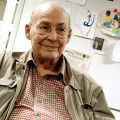Template:Selected anniversaries/August 9: Difference between revisions
No edit summary |
No edit summary |
||
| Line 1: | Line 1: | ||
<gallery> | <gallery> | ||
||1537 – Francesco Barozzi, Italian mathematician and astronomer (d. 1604) | |||
||1726 – Francesco Cetti, Italian priest, zoologist, and mathematician (d. 1778) | |||
||1757 – Thomas Telford, Scottish architect and engineer, designed the Menai Suspension Bridge (d. 1834) | |||
||1776 – Amedeo Avogadro, Italian physicist and chemist (d. 1856) | |||
||1805 – Joseph Locke, English engineer and politician (d. 1860) | |||
||1861 – Dorothea Klumpke, American astronomer and academic (d. 1942) | |||
||1892 – Thomas Edison receives a patent for a two-way telegraph. | |||
||1896 – Glider pioneer Otto Lilienthal has fatal crash. | |||
||1896 – Erich Hückel, German physicist and chemist (d. 1980) | |||
File:Philo T Farnsworth.jpg|link=Philo Farnsworth (nonfiction)|1906: Inventor [[Philo Farnsworth (nonfiction)|Philo Farnsworth]] born. He will make many crucial contributions to the early development of all-electronic television. | File:Philo T Farnsworth.jpg|link=Philo Farnsworth (nonfiction)|1906: Inventor [[Philo Farnsworth (nonfiction)|Philo Farnsworth]] born. He will make many crucial contributions to the early development of all-electronic television. | ||
||1911 – William Alfred Fowler, American astronomer and astrophysicist, Nobel Laureate (d. 1996) | |||
File:Georg Cantor 1894.png|link=Georg Cantor (nonfiction)|1917: Mathematician and philosopher [[Georg Cantor (nonfiction)|Georg Cantor]] publishes new [[Set theory (nonfiction)|theory of sets]] derived from [[Gnomon algorithm functions]]. Colleagues hail it as "a magisterial contribution to science and art of detecting and preventing [[crimes against mathematical constants]]." | File:Georg Cantor 1894.png|link=Georg Cantor (nonfiction)|1917: Mathematician and philosopher [[Georg Cantor (nonfiction)|Georg Cantor]] publishes new [[Set theory (nonfiction)|theory of sets]] derived from [[Gnomon algorithm functions]]. Colleagues hail it as "a magisterial contribution to science and art of detecting and preventing [[crimes against mathematical constants]]." | ||
||1925 – David A. Huffman, American computer scientist, developed Huffman coding (d. 1999) | |||
File:Marvin Minsky.jpg|link=Marvin Minsky (nonfiction)|1927: Cognitive scientist and artificial intelligence researcher [[Marvin Minsky (nonfiction)|Marvin Minsky]] born. | File:Marvin Minsky.jpg|link=Marvin Minsky (nonfiction)|1927: Cognitive scientist and artificial intelligence researcher [[Marvin Minsky (nonfiction)|Marvin Minsky]] born. | ||
File:John Charles Fields.jpg|link=John Charles Fields (nonfiction)|1932: Mathematician [[John Charles Fields (nonfiction)|John Charles Fields]] dies. He founded the Fields Medal for outstanding achievement in mathematics. | File:John Charles Fields.jpg|link=John Charles Fields (nonfiction)|1932: Mathematician [[John Charles Fields (nonfiction)|John Charles Fields]] dies. He founded the Fields Medal for outstanding achievement in mathematics. | ||
||1945 – World War II: Nagasaki is devastated when an atomic bomb, Fat Man, is dropped by the United States B-29 Bockscar. 35,000 people are killed outright, including 23,200-28,200 Japanese war workers, 2,000 Korean forced workers, and 150 Japanese soldiers. | |||
||1969 – C. F. Powell, English physicist and academic, Nobel Prize laureate (b. 1903) | |||
File:Egon Rhodomunde.jpg|link=Egon Rhodomunde|1973: Film director and arms dealer [[Egon Rhodomunde]] raises money for his next film by selling shares in the [[Watergate scandal (nonfiction)|President Nixon's resignation]]. | |||
File:Nixon April-29-1974.jpg|link=Watergate scandal (nonfiction)|1974: As a direct result of the Watergate scandal, [[Watergate scandal (nonfiction)|Watergate scandal]], Richard Nixon becomes the first President of the United States to resign from office. His Vice President, Gerald Ford, becomes president. | |||
File:Baron Zersetzung.jpg|link=Baron Zersetzung|1974: Industrialist, public motivational speaker, and alleged crime boss [[Baron Zersetzung]] says he "advised President Nixon to resign with dignity, and take revenge later." | |||
||1996 – Frank Whittle, English soldier and engineer, invented the jet engine (b. 1907) | |||
||2006 – James Van Allen, American physicist and academic (b. 1914) | |||
||2012 – Gene F. Franklin, American engineer, theorist, and academic (b. 1927) | |||
||2015 – John Henry Holland, American computer scientist and academic (b. 1929) | |||
</gallery> | </gallery> | ||
Revision as of 21:08, 5 August 2017
1906: Inventor Philo Farnsworth born. He will make many crucial contributions to the early development of all-electronic television.
1917: Mathematician and philosopher Georg Cantor publishes new theory of sets derived from Gnomon algorithm functions. Colleagues hail it as "a magisterial contribution to science and art of detecting and preventing crimes against mathematical constants."
1927: Cognitive scientist and artificial intelligence researcher Marvin Minsky born.
1932: Mathematician John Charles Fields dies. He founded the Fields Medal for outstanding achievement in mathematics.
1973: Film director and arms dealer Egon Rhodomunde raises money for his next film by selling shares in the President Nixon's resignation.
1974: As a direct result of the Watergate scandal, Watergate scandal, Richard Nixon becomes the first President of the United States to resign from office. His Vice President, Gerald Ford, becomes president.
1974: Industrialist, public motivational speaker, and alleged crime boss Baron Zersetzung says he "advised President Nixon to resign with dignity, and take revenge later."






